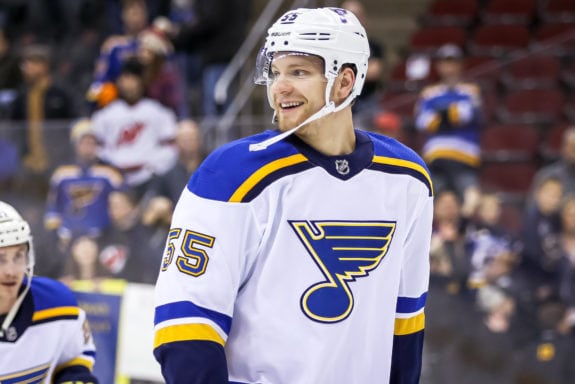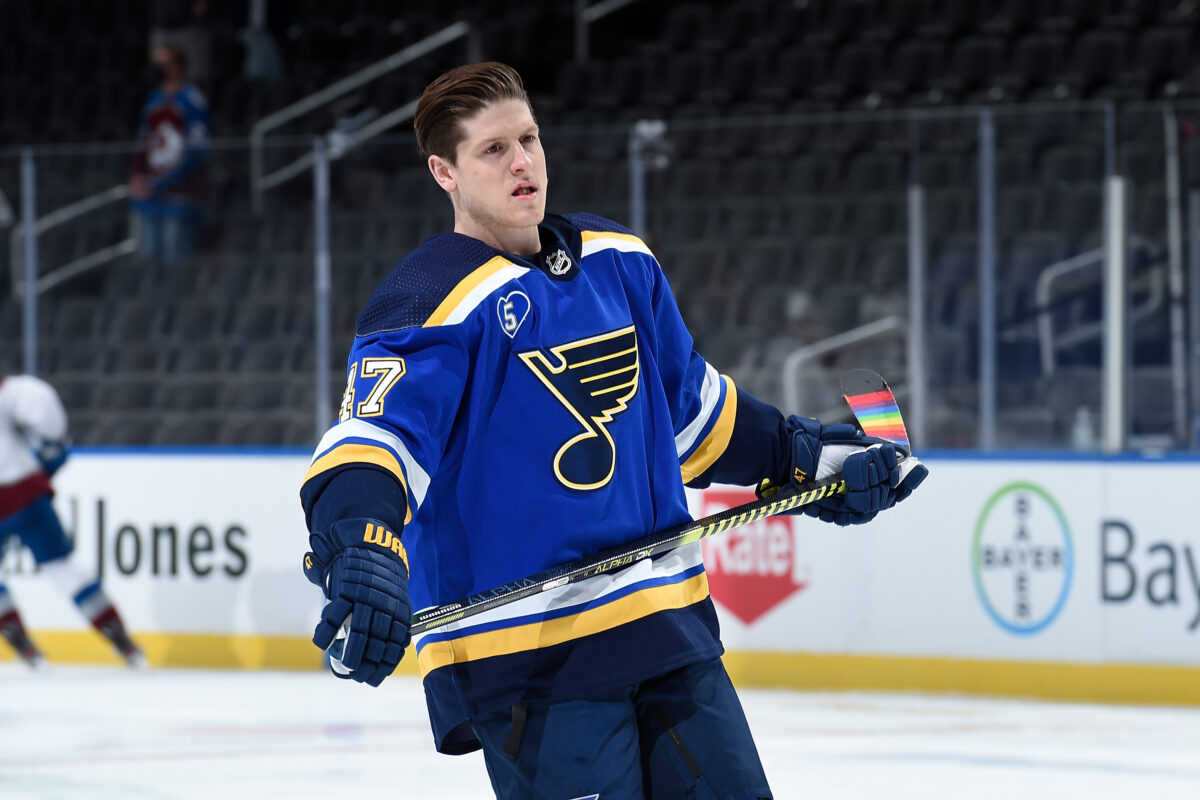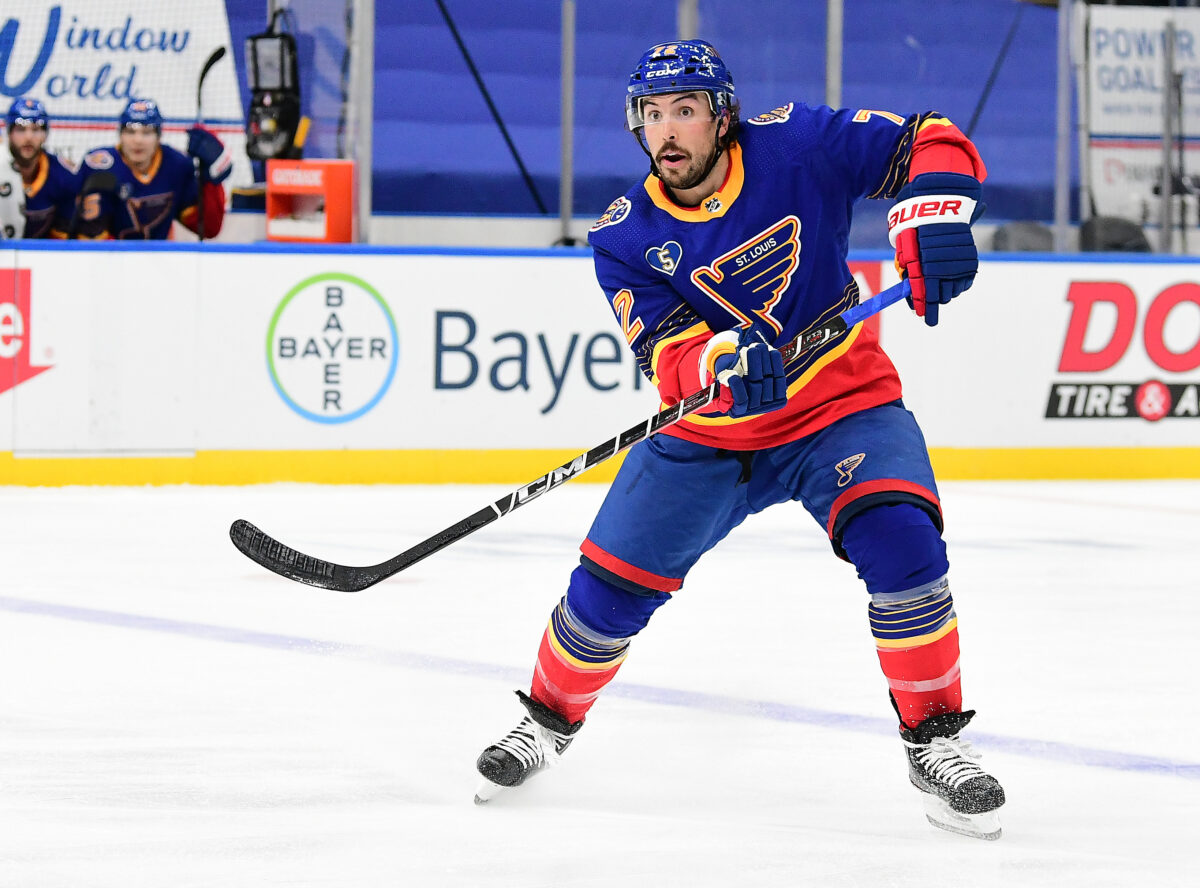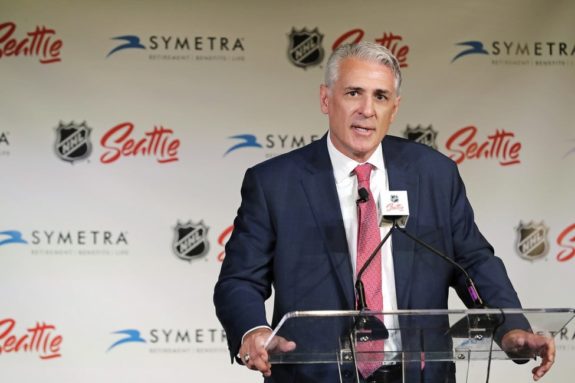The St. Louis Blues were clearly an emaciated team during their first season without former captain Alex Pietrangelo, currently the odds leader for the Conn Smythe Trophy while playing for the Vegas Golden Knights. Without him, the Blues snuck into the playoffs only by claiming the final spot in the weak West Division, before promptly being drummed out of the postseason in four games by the Colorado Avalanche.
All season long, it was obvious that the Blues defense lacked identity, and heading into the offseason, that unit is a major area of concern for many fans. But the solution may not be as simple as adding a top free agent defenseman like Jamie Oleksiak. The Blues’ defensive issues run deeper than that, and, if general manager Doug Armstrong isn’t careful, he could create a near-decade-long logjam that could force the 2019 Stanley Cup champions into rebuild mode sooner rather than later.
The Problem
The Blues are in a tricky situation defensively, where their defense suffers less from a lack of talented contributors and more from the wrong mix of roles. If you polled Blues fans on what their preferred defensive lineup using only defensemen currently on the roster, you would likely get a variety of responses. But the best possible combination would probably look something like this:
Colton Parayko — Torey Krug
Justin Faulk — Vince Dunn
Robert Bortuzzo — Marco Scandella
That defensive mixture cost the team $25.025 million in salary cap hit this season (and likely would cost nearly that next season) and resulted in a team that ranked 22nd in expected goals against per 60 (xGA/60, 2.89) and 27th in expected goals for percentage (xGF%, 45.21) this season (in 2019-20, with Pietrangelo still on the team, they ranked 10th/2.74 and 17th/50.2 respectively). Of course, this group leaves out young players like Jake Walman and Niko Mikkola who made a big contribution last season. And there is every reason to expect that Dunn will not be on the team again next season, with his struggles to establish himself ahead of the looming Seattle expansion draft. But the bigger concern with this defense is not who will fill out the bottom half but the logjam at the top between Parayko, Krug, and Faulk.

Colton Parayko (Jess Starr/The Hockey Writers) 
Torey Krug (Photo by Joe Puetz/NHLI via Getty Images) 
Justin Faulk (Photo by Keith Gillett/Icon Sportswire via Getty Images),
The Blues do not have an obvious top four as currently constructed. Parayko has not reestablished his defensive shutdown role since Jay Bouwmeester’s sudden departure, and he has not yet shown that he can truly be a cornerstone first-pairing defenseman, particularly because his offense hasn’t developed the way many Blues fans hoped it might. Krug is a power play specialist and not as much of a liability defensively as some may think, but he struggled to transition into the Blues’ system and is probably best served for a second-pairing role where he can play big minutes in the offensive zone. And Faulk, despite having an incredible season, also has struggled in his career to play the kind of consistent two-way defense a team needs to be a go-to right-handed defenseman.
In short, the Blues have three defensemen who would be luxuries on a second pairing but mild liabilities on the first pairing. Two of them are already locked up for six more years with a $6.5 million average annual value (AAV). To complicate matters, Parayko is owed a contract extension after the 2021-22 season. It seems unlikely that he would take anything less than a matching cap hit, or perhaps slightly less if the Blues commit to a full-term (eight-year) contract. If the Blues commit roughly $20 million for the next six seasons to these three defensemen without any proof that they can form a cohesive unit, they could plummet themselves into seasons of mediocrity before sparking a rebuild. The question becomes: how can the Blues best address this problem before the 2021-22 season with an eye on their long-term future?
Solution 1: Expose Krug or Faulk to Seattle
This is a popular option amongst a subsection of the Blues’ fanbase, but not a realistic one. The Seattle Kraken expansion draft is coming soon on July 21, and some fans would like to see Armstrong leave one of Faulk or Krug exposed, as neither has contract-enforced expansion draft protection via a no-movement clause (NMC). The logic goes that the Kraken need to hit the salary cap floor, both Krug and Faulk are valuable NHL defenseman, and so the Kraken would be eager to select either if they were exposed (Seattle GM Ron Francis does have a history with Faulk from their time together with the Carolina Hurricanes). The Blues could then protect Dunn and extend Parayko without concern, and figure the rest out from there.

The problem with this solution is that the risks outweigh the rewards. Even if Krug or Faulk were left available, there’s no guarantee the Kraken would be interested, especially as the Blues will still need to expose at least one or two potentially valuable young forwards like a Sammy Blais, an Ivan Barbashev, or a Zach Sanford. Yes, Seattle needs to hit the cap floor, but they won’t do it recklessly. They’d much rather do it with shorter contracts as they build a roster worthy of spending money on.
If the Blues leave either defenseman exposed and Seattle doesn’t take him, they would then have an angry and unhappy defenseman in their locker room with no obvious escape route for the next six seasons. Armstrong isn’t going to take that risk. Besides, and most importantly, even if Blues fans are unhappy with their contract or output, and even if their trade value is limited, St. Louis still has far less valuable players they can leave exposed for Seattle to claim.
Solution 2: Trade Krug or Faulk
this is a variation of the first solution, but worth discussing independently, especially as it’s probably the most popular solution with many Blues fans. Many would like to see Armstrong pull a massive shocker and trade one of Krug or Faulk to clear up salary cap space. This outcome is highly unlikely for several reasons: first, NHL teams rarely trade players so soon after signing long contracts. GMs don’t like to admit mistakes that quickly, and they don’t want to earn a reputation as unreliable in contract negotiations. Second, if Blues fans are concerned about keeping the Krug and Faulk contracts for six more seasons, there’s no question that other NHL GMs will be, too.
Trading one of Krug or Faulk is much more likely than surrendering either to Seattle, but it still isn’t very likely. It’s hard to imagine that Armstrong is ready to move on from the contracts he believed in, and even if he is, it takes two to tango. Both players have no-trade clauses (NTCs) to navigate around, and if Armstrong could find a willing trade partner, they would likely want to send back salary to offset the risk of the long contract. It isn’t impossible, but it would be a real challenge for Armstrong to trade Krug or Faulk in a deal that clearly improves the team.
Solution 3: Trade Parayko
This will certainly be the least popular option, but it is by far the most likely. Parayko has just one season left on his current contract and, as we mentioned, will expect an extension rivaling or surpassing the $6.5 million AAVs on the contracts Armstrong gave Faulk and Krug. It is hard to imagine after last season’s defensive performance that the Blues will be eager to commit to that trio with three long contracts. And the tough reality is that Parayko is by far the most moveable asset.
NHL teams will highly value Parayko, even after a rough season, especially if he signs a contract as part of a possible trade. He is an undisputed top-four right-handed defenseman, and even if he isn’t quite on par with the true cornerstone defensemen in the league, he’d be the best RHD on many team’s rosters right now. We recently mentioned the possibility that the Alberta native could return to Calgary as part of a deal for Matthew Tkachuk if that rumor did materialize. But even ignoring that unlikely scenario, plenty of teams would be eager to add Parayko. The 2012 third-round pick is incredibly popular in St. Louis and most fans would hate to see him go. But the reality of the Blues’ defensive logjam might make it necessary.
Armstrong’s Tough Decision
In all likelihood, Armstrong will have to make a tough decision this summer. He lost Pietrangelo last season, and it’s very possible he’ll lose Jaden Schwartz this summer. He cannot lose a key player for free again next season. At the same time, it’s doubtful he will want to lock up Faulk, Krug, and Parayko on three long-term deals totaling a $20-million-plus salary cap hit. So a solution needs to be found. The one likely answer that could solve the logjam, avoid another costly defensive contract, and add immediate value to the team is trading Parayko this summer. But that kind of move would be very unpopular if the return isn’t right on the money. A GM’s job is to make tough decisions. But for Armstrong, this decision will be tougher than most.